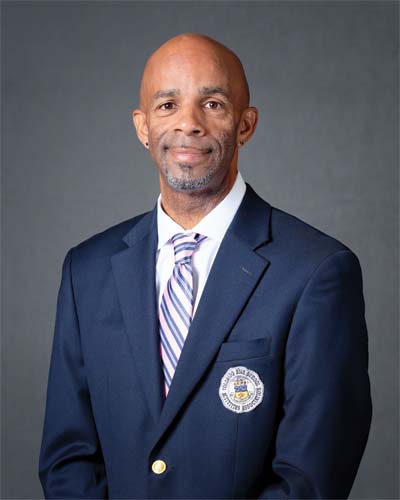 Rashaan Davis likes to think back to what he was like as a 15-year-old. It’s not that he’s especially nostalgic because, let’s face it, that’s often a tough age for kids. Davis likes to reminisce because it helps him remember what it was like to be starting high school, and what could have made him feel more welcome, more supported, and—ultimately—more successful in his new building.
Rashaan Davis likes to think back to what he was like as a 15-year-old. It’s not that he’s especially nostalgic because, let’s face it, that’s often a tough age for kids. Davis likes to reminisce because it helps him remember what it was like to be starting high school, and what could have made him feel more welcome, more supported, and—ultimately—more successful in his new building.
“I think about not what I wanted, but what I needed,” he says. “What activities were there for me, what role models were around, what doors did I need opened as I was taking part in activities in my own time?” Davis’ focus on activities is understandable. Earlier this year, he was selected as assistant commissioner of the Colorado High School Activities Association based in Aurora, CO. It’s a milestone in his 25-year career in education.
A native Coloradan, Davis joined the Army after graduating from college (where he was elected student body president). After serving in the Army for three years, his first job in education was as a sociology and economics teacher in Highlands Ranch, CO. In addition to teaching, his work in education has included positions as an administrator and, for the last 17 years, a student leadership adviser.
In his new role as assistant commissioner, Davis will oversee a whole range of activities, including student leadership, speech and debate, music, and e-sports. It’s one of few positions in the country specifically devoted to activities. Another commissioner in the state deals with athletics.
Far more students nationwide participate in school activities than play competitive sports, Davis notes. The National Federation of State High School Associations (NFHS) estimates that 9.6 million students participate in various activities. To break it down, 6.7 million students participate in band, compared to 1 million who play football. That brings us back to thinking about what 15-year-olds need and how that can inspire advisers and other staff involved in activities to broaden their thinking. This is especially important when it comes to promoting equity throughout the whole school community and increasing the number and diversity of students who participate in activities that sometimes have been seen as primarily the domain of white or more affluent students.
“People know what their high school experience looked like,” Davis says, “so it’s hard for them to imagine any other way. Systems are created to give us what we want, so I always ask people to just evaluate their system. Many times, we don’t necessarily make changes to those systems because they’ve worked.”
Small Changes Can Bring Big Results
Take e-sports, for example. Students interested in online gaming are already going to be playing in the lunchroom and outside of school. Bringing e-sports under the school activities umbrella can tap into a different part of the school community, Davis points out. “We’re giving [students] a chance to form a team, and we’re creating some opportunities for them to support their school while they’re doing something they love.”
That’s a small example, but what about the broader idea that many school activities can be too exclusive? “I love having those conversations,” Davis says. “We’re not asking anyone to change what they’re doing as much as we’re asking them to take a look at what they’re doing. If they see a way that they can open up the door of opportunity by doing one quick thing here or there, it’s a game changer.”
To get more concrete, he talks about the role of grade point average in National Honor Society requirements. “If you go from a minimum GPA standard of 3.7 and bring that down to 3.6, how many more kids, and how many more kids of color, do you bring in? Or take it down to 3.5, and the pool expands even more. I’m not telling you to lessen your standards in all areas. But at what point does it become an activity that you’ve blocked kids out of?”
Cost of membership to the student can be another hurdle—things like T-shirts, dinners, and travel, in addition to any membership fees, he adds. While decisions about cost vary by location, Davis says one of his roles is to help school leaders understand the connection between fees and participation and to help them come up with more equitable systems.
Student leadership is another area where Davis sees great potential to increase the number and diversity of students who participate. Traditionally, student council has often been an after-school group that met to plan events like school dances. No longer is such an event the focus, he says. “The event is now kind of secondary to all the leadership training kids are receiving. We’re trying to open that up to more kids because it’s totally viable. And it’s those soft skills like leadership that the real world is asking for,” he says.
Can You Say Your Students Love Going to School?
Broader participation, as measured by more students as well as greater diversity, is certainly important. But that’s not necessarily how Davis likes to gauge success. “For me, it’s always been about how kids felt about being in our building,” he says. “If you stop 10 kids in the hallway, you want all 10 of them to be able to say, ‘This is a great school; I love going here.’ You want them to feel what you are putting out there, which is care and respect and hopefully growth. And once students feel better about a place where they don’t necessarily want to be, then they’re more likely to try something new.”
The pandemic has changed schools, and the activities that students participate in, in some ways that educators and school leaders are just starting to see. For example, Davis points out that education is full of transitions, such as between grades and school levels. Many students missed those transitions during virtual learning. And just being in school full time is something most students haven’t experienced in a couple of years.
“You’re seeing kids who don’t understand what school spirit is. They’ve never really experienced it the traditional way,” he says. “Before we can do all the rah-rah stuff, we need to teach kids how to be in our hallways and how to be in our cafeterias. Some teachers have gone back to teaching some of that basic stuff.”
Listen to the Kids
Davis has a simple piece of advice for anyone involved in student activities, and it goes back to thinking about his 15-year-old self: “We need to listen more to kids. That’s the beginning, the middle, and the end. If you’re a leadership adviser, the first question you have to answer is: Have you asked the kids?”
“They’re going to tell you exactly what they’re feeling,” he says. “They’re going to tell you exactly how it could be better. And they’re going to tell you how to do it in a 21st-century way. They are going to tell you whatever you need to know. But sometimes we don’t even ask them.”
Davis knows that school staff often get thrown into an adviser/activities assignment with little to no warning or preparation. “You’re a math teacher and, oh yeah, all of a sudden you have this other assignment,” he says.
Don’t panic, he advises. For one thing, help is a phone call away from your state activities association. Davis and his counterparts around the country love to help schools succeed with whatever activities they undertake. “We have lots of resources, so reach out. We just really want to be able to help and know that you are connecting with kids and making things happen at your school.”
Don’t expect immediate success, he adds. The first year of almost any activity is difficult, so it’s probably unrealistic to expect big accomplishments. It’s the second year where you can really make progress, he explains. “If you stick with it, you can start to give kids opportunities where they can really thrive in school, through mentoring, teaching, coaching, and advising. I think that’s awesome.”
Dan Gursky is a freelance education writer and editor based in Washington, D.C.

Rashaan Davis, assistant commissioner of the Colorado High School Activities Association
Sidebar: Advice From the Experts
In January, advisers, educators, and school leaders will have the opportunity to hear from Davis and other presenters in a webinar titled “Assessing Equity in Your Student Activities.” The webinar will focus on the role of diversity and inclusion in student activities, including organizations such as the National Honor Society. Speakers will discuss strategies they’ve used to transform and build student activities and leadership programs. The panel conversation and interactive Q&A will also highlight best practices for creating equitable opportunities throughout the school community. To register, visit bit.ly/3kq33lD.

